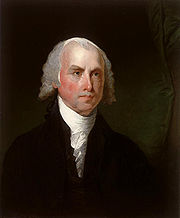
Federalist No. 58
Encyclopedia

James Madison
James Madison, Jr. was an American statesman and political theorist. He was the fourth President of the United States and is hailed as the “Father of the Constitution” for being the primary author of the United States Constitution and at first an opponent of, and then a key author of the United...
, the fifty-eighth of the Federalist Papers
Federalist Papers
The Federalist Papers are a series of 85 articles or essays promoting the ratification of the United States Constitution. Seventy-seven of the essays were published serially in The Independent Journal and The New York Packet between October 1787 and August 1788...
. It was published on February 20, 1788 under the pseudonym
Pseudonym
A pseudonym is a name that a person assumes for a particular purpose and that differs from his or her original orthonym...
Publius, the name under which all the Federalist Papers were published. This paper examines the ability of the United States House of Representatives
United States House of Representatives
The United States House of Representatives is one of the two Houses of the United States Congress, the bicameral legislature which also includes the Senate.The composition and powers of the House are established in Article One of the Constitution...
to grow with the population of the United States
United States
The United States of America is a federal constitutional republic comprising fifty states and a federal district...
. It is titled, "Objection That The Number of Members Will Not Be Augmented as the Progress of Population Demands Considered."
The main topic of discussion in Federalist Paper number 58 is the apportionment of the representatives for each state. Constitutionally, the number of Senators per state is two, no matter the size population. The number of House Representatives, however, is solely based on population (30,000 per representative). The smaller states, Madison says, are complaining for they fear they will not justly be represented on account of their having fewer representatives in the House than larger states. Madison addresses their complaints by pointing out that they actually have the advantage when it comes to Senators. He points out the ridiculous, illogical, and passionate claims of both the complaining larger and smaller states. The smaller states wish for every state to have the same amount of representatives in the House, but Madison again conveys that this would be wholly illogical on account of the fact that there would be very few people being represented by many representatives in some cases, and very few representatives for a vast amount of people in others.
Madison then discusses the reasons fewer representatives in the House are actually more beneficial than having a vast number. He points out that when there are more representatives than needed, passion will often rule over logic and order; with more representatives in the House, chaos would prevail over order and unification resulting in the depletion of the House’s purpose. Madison also mentions that the more representatives they have, the less information and insight each one will have; essentially, as the number increases, the quality of each individual will predictably decrease. Another disadvantage that Madison mentions is the disadvantage of pliability within the House. He says that if there are more representatives, they will be likely to be easily persuaded by a cunning speaker; the weak-mindedness of the majority cannot withstand the shrewdness of the minority.
Madison also briefly mentions the wishes of some states that rulings be passed on a vote of more than a majority. For example, if 59% of the House votes for a certain law to be passed, and 41% vote against it, then the law will not be passed because there are not a significant number of votes over the majority. Madison says that this method of voting is not only inefficient, because no laws would ever be passed, but he also says that our government would be more oligarchic rather than democratic (rule of elite or minority rather than majority).

